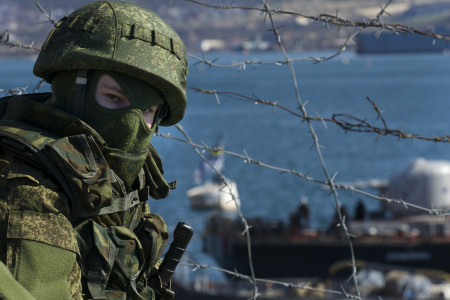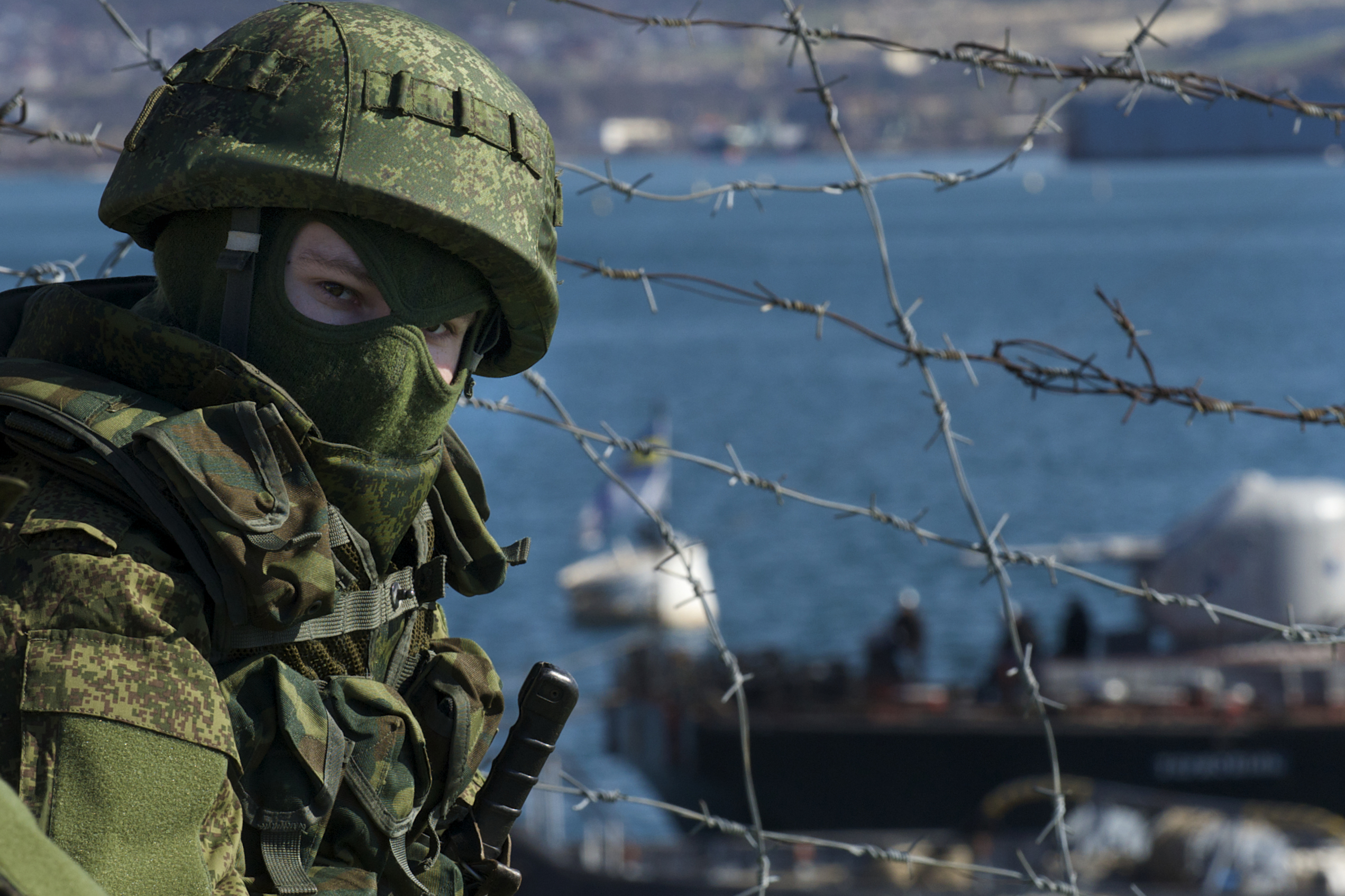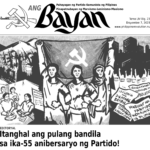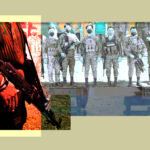
Russian soldiers guard a pier where two Ukrainian naval ships are moored, in Sevastopol, Ukraine, on Wednesday, March 5, 2014.
The hard truth is that worn out Ukraine has no capacity to reclaim Crimea, however ultra-nationalist factions will pressure against any cease-fire.
Written by Uriel Araujo, researcher with a focus on international and ethnic conflicts
According to a Quincy Institute for Responsible Statecraft’s director, Anatol Lieven, Kiev is now divided regarding the idea of “reconquesting” Crimea. Andriy Sybiha, for instance, Ukraine’s presidential staff’s deputy head, has stated that “we are ready to open a diplomatic page to discuss this issue [with Moscow].” The hard truth is that worn out Ukraine has no capacity to reclaim the peninsula. This is a divisive matter, however. Ukrainian President Volodymyr Zelensky himself so far has ruled out any (much needed) peace talks until Kiev reclaims Crimea and Donbass.
Admitting that much of Crimea’s population has historically identified with Russia, Lieven quotes a recent interview given by Ukrainian nationalist Mykhailo Podolyak, who is an advisor to Zelensky. In that interview, he says that “we have to eradicate everything Russian” and that “we should not have a dialogue about whether a person has the right to use the Russian language or not.” He adds that “pro-Russian” Crimeans “should be expelled, and some should be imprisoned”. Somewhat similar views were voiced by Zelensky in 2021.
Describing Podolyak’s vision as potentially “tantamount to ethnic cleansing”, Lieven notes that such views are not shared by most Ukrainians with whom he spoke during his recent trip. According to a July 2022 poll, 58 percent of the Ukrainians interviewed said Crimea should return to Ukraine: this is a majority, but “not a huge one”, Lieven notes.
On March 16, 2014, the Crimean status referendum asked voters whether they wanted to rejoin Russia. With an 83 percent voter turnout, the official result was a 96.7 percent vote in favor of it. That result, according to the Washington Post, at the time, was widely expected because “the region has deep historical ties to Russia.” According to the same 2014 news report, “in Crimea, residents began celebrating (…). In Sevastopol, drivers with Russian flags flying from their car windows sped through the city honking horns.”
After the Crimea referendum, the region was incorporated into the Russian Federation. Whatever one thinks of it, the fact remains that the UN International Court of Justice’s decision on Kosovo’s 2008 unilateral declaration of independence set a precedent. That court ruled that the territory of a given state, in exercising its self-determination right, is not obliged to apply to that state’s central authorities for permission to declare its own sovereignty. The Western double standard is thus undeniable: in yet another instance of it, European powers, of course, have neither recognized Catalonia’s independence nor sanctioned Madrid.
Self-determination of “peoples” in practice is not as simple as it may appear to be: the matter is complicated by ethnopolitical and legal issues and by the very ethnological definition of what a “people” is. Post-Soviet borders and frontiers are a complicated business, and there are a number of disputed zones today in Eastern Europe and in the Caucasus. Soviet Union collapse was not just the end of socialism, but also the disintegration of a multi-ethnic and multinational territorial governance system. The region has a tradition of multinational federalism.
Ukrainian, however, is the only state language in Ukraine since the 1996 Constitution and any bilingual system is forbidden. In his 2014 monograph, the late Mikhail Guboglo, a Russian Academy of Sciences ethnologist, wrote that Kiev’s russophobic policy of rejecting bilingualism and the Ukrainian political elite aversion to federalism were making Ukraine an “ethnocratic” state, thereby alienating most Crimeans.
The crisis the country has faced since 2014 did not start with the Crimean referendum of course – nor with the Donbass civil war. According to Columbia University professor Jeffrey Sachs, it started with the 2014 US backed coup that overthrew pro-Russian President Viktor Yanukovych. The roots of it in turn lie in a post-independence Ukraine’s political elite attempt at “nation-building”, which increasingly took the form of rejecting all things Russian, culminating in the 2014 Maidan, a ultranationalist revolution also backed by Washington.
However, besides all that, the 2014 crisis can also be traced to the 1990 Western “broken promise” and NATO expansion. After the West supported an aggressively russophobic government in Kiev, NATO’s intended expansion into Ukraine could only be seen as the final straw. Even Pope Francis famously claimed in May 2022 that NATO “barking” at Russia’s door had provoked Moscow into acting. Washington would never tolerate Chinese or Russian bases in Mexico, for one thing. All the above is part of the larger context that one should always keep in mind.
Describing Kiev’s policy on Crimea as one that has been both uncompromising and “increasingly indefensible”, Lieven argues that it has trapped the Ukrainian government and that now many within it no longer see the “reconquest” of Crimea as a “nonnegotiable goal”. Lieven claims that, even though such voices for negotiation and reconciliation are growing louder, in any case, Zelensky would face great “difficulties” domestically should he support any cease-fire that would leave Crimea “in Russian hands.”
This is an understatement: one needs only to recall the fact that, on May 27, 2019, Dmytro Yarosh, then adviser to the Commander-in-Chief of the Armed Forces of Ukraine Valerii Zaluzhny, bluntly stated that President Zelensky would “lose his life” and “hang on a tree on Khreshchatyk” if he ever “betrayed” Ukrainian nationalists by negotiating an end to the civil war in Donbass. One can assume the same reasoning applies to Crimea. Yarosh is a former commander of the far-right Ukrainian Volunteer Army. Considering Ukraine’s persistent problem with extremist right-wing violence and the well known neo-Nazism of the key US-backed Azov battalion, one can safely conclude that any Kiev concession aiming at a cease-fire would face domestic challenges and could escalate internal tensions.
Such is the “Frankenstein monster”, as Lieven calls it, faced by Eastern Slavic populations today amid a proxy regional conflict that haunts the world with the specter of nuclear escalation.



